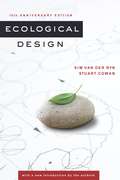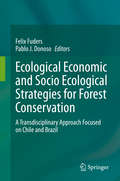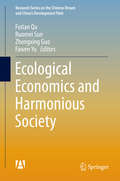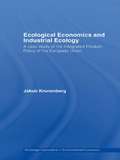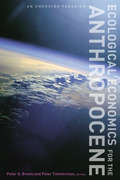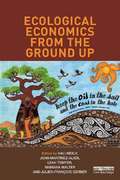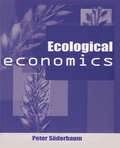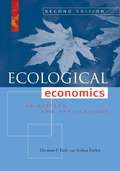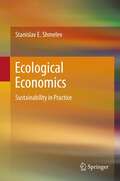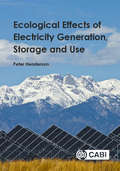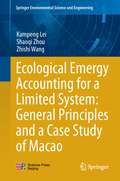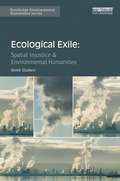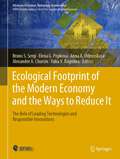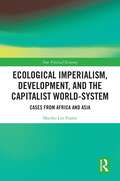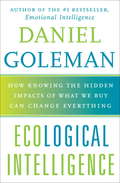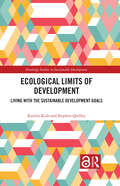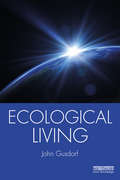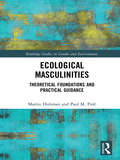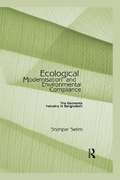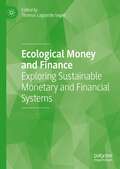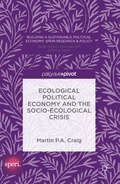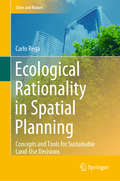- Table View
- List View
Ecological Design, Tenth Anniversary Edition: An Ecological Design Retrospective
by Sim Van der Ryn Stuart CowanEcological Design is a landmark volume that helped usher in an exciting new era in green design and sustainability planning. Since its initial publication in 1996, the book has been critically important in sparking dialogue and triggering collaboration across spatial scales and design professions in pursuit of buildings, products, and landscapes with radically decreased environmental impacts. This 10th anniversary edition makes the work available to a new generation of practitioners and thinkers concerned with moving our society onto a more sustainable path. Using examples from architecture, industrial ecology, sustainable agriculture, ecological wastewater treatment, and many other fields, Ecological Design provides a framework for integrating human design with living systems. Drawing on complex systems, ecology, and early examples of green building and design, the book challenges us to go further, creating buildings, infrastructures, and landscapes that are truly restorative rather than merely diminishing the rate at which things are getting worse.
Ecological Economic and Socio Ecological Strategies for Forest Conservation: A Transdisciplinary Approach Focused on Chile and Brazil
by Felix Fuders Pablo J. DonosoThis book proposes strategies for improving the resilience and conservation of temperate forests in South America, such that these forests can provide ecosystem services in a sustainable way. As such it contributes to the design of a resilient human-forest model that takes into account the multiculturalism of local communities, in many cases including aspects of ecological economics, development economics and territorial development planning that are related to indigenous peoples or first nations. Further, it provides proposals for public and territorial policies that improve the state of conservation of native forests and forest ecosystems, based on a critical analysis of the economic factors that lead to the degradation of forest ecosystems in South America today. This edition was conceived by members of the Transdisciplinary Research Center for Social and Ecological Strategies for Sustainable Forest Management in South America at the Universidad Austral de Chile. It includes contributions by distinguished researchers from around the world, combining the fields of economics, ecology, biology, anthropology, sociology and statistics. It is not, however, simply a collection of works written by authors from different disciplines, but rather each chapter is in itself transdisciplinary. This approach makes the book a unique contribution to enhancing social, managerial and political approaches to forestry management, helping to protect forest ecosystem services and make them more sustainable. This, in turn, will benefit local communities and society as a whole, by reducing the negative externalities of forestry management and enhancing future opportunities.
Ecological Economics and Harmonious Society
by Futian Qu Ruomei Sun Zhongxing Guo Fawen YuThis book is mainly about the examination of shifting in the field of ecological economics resulting from its evolution over the past three decades. It discusses the theory and methodology of ecological economics and development of ecological economics and related policies. It also analyzes the empirical study of ecological economics and the value of and compensation for ecological system services. Successfully combining theory and concrete practical guidelines, the book offers a valuable resource for all those active in this dynamic field.
Ecological Economics and Industrial Ecology: A Case Study of the Integrated Product Policy of the European Union (Routledge Explorations In Environmental Economics Ser.)
by Jakub KronenbergHolistic in approach and rooted in the real world Ecological Economics and Industrial Ecology presents a new way of looking at environmental policy; exploring the relationship between ecological economics and industrial ecology.Concentrating on the conceptual background of ecological economics and industrial ecology, this book:provides a selection
Ecological Economics for the Anthropocene
by Peter G. Brown Peter TimmermanEcological Economics for the Anthropocene provides an urgently needed alternative to the long-dominant neoclassical economic paradigm of the free market, which has focused myopically-even fatally-on the boundless production and consumption of goods and services without heed to environmental consequences. The emerging paradigm for ecological economics championed in this new book recenters the field of economics on the fact of the Earth's limitations, requiring a total reconfiguration of the goals of the economy, how we understand the fundamentals of human prosperity, and, ultimately, how we assess humanity's place in the community of beings. Each essay in this volume contributes to an emerging, revolutionary agenda based on the tenets of ecological economics and advances new conceptions of justice, liberty, and the meaning of an ethical life in the era of the Anthropocene. Essays highlight the need to create alternative signals to balance one-dimensional market-price measurements in judging the relationships between the economy and the Earth's life-support systems. In a lively exchange, the authors question whether such ideas as "ecosystem health" and the environmental data that support them are robust enough to inform policy. Essays explain what a taking-it-slow or no-growth approach to economics looks like and explore how to generate the cultural and political will to implement this agenda. This collection represents one of the most sophisticated and realistic strategies for neutralizing the threat of our current economic order, envisioning an Earth-embedded society committed to the commonwealth of life and the security and true prosperity of human society.
Ecological Economics for the Anthropocene: An Emerging Paradigm
by Peter G. Brown Peter Timmerman Eds.Ecological Economics for the Anthropocene provides an urgently needed alternative to the long-dominant neoclassical economic paradigm of the free market, which has focused myopically—even fatally—on the boundless production and consumption of goods and services without heed to environmental consequences. The emerging paradigm for ecological economics championed in this new book recenters the field of economics on the fact of the Earth's limitations, requiring a total reconfiguration of the goals of the economy, how we understand the fundamentals of human prosperity, and, ultimately, how we assess humanity's place in the community of beings.Each essay in this volume contributes to an emerging, revolutionary agenda based on the tenets of ecological economics and advances new conceptions of justice, liberty, and the meaning of an ethical life in the era of the Anthropocene. Essays highlight the need to create alternative signals to balance one-dimensional market-price measurements in judging the relationships between the economy and the Earth's life-support systems. In a lively exchange, the authors question whether such ideas as "ecosystem health" and the environmental data that support them are robust enough to inform policy. Essays explain what a taking-it-slow or no-growth approach to economics looks like and explore how to generate the cultural and political will to implement this agenda. This collection represents one of the most sophisticated and realistic strategies for neutralizing the threat of our current economic order, envisioning an Earth-embedded society committed to the commonwealth of life and the security and true prosperity of human society.
Ecological Economics from the Ground Up
by Julien-François Gerber Hali Healy Joan Martínez-Alier Leah Temper Mariana WalterEcological Economics from the Ground Up takes a unique and much-needed bottom-up approach to teaching ecological economics and political ecology, using case studies that focus on a wide range of internationally relevant topics, to teach the principles, concepts, methods and tools of these fields, which are seen as increasingly important in the context of the current triple social, economic and environmental crisis. This book provides learning materials which are grounded in the experience of Civil Society Organisations (CSOs), with case studies chosen by CSOs and developed collaboratively with leading ecological economists. The case studies come from Europe, India, Latin America, and Africa, and are presented thematically along three lines: 1) social metabolism and accounting methods, 2) institutions and participation, and 3) valuation and environmental policy tools. Core tools, concepts and glossary terms are embedded in topics chosen as a matter of urgency by activist organizations, related to mining and fossil fuel extraction, integrated transport infrastructure development, deforestation and agro-fuel production, sustainable tourism, waste management, wetlands and water management, payments for ecosystem services, natural disasters and hazards, and corporate accountability. Ecological Economics from the Ground Up has been designed to be an accessible learning aid for students of the sustainability sciences and for those CSOs that have recognised the value that ecological economics and political ecology tools and methods hold for their research and advocacy work.
Ecological Economics: Political Economics for Social and Environmental Development (Routledge Studies In Ecological Economics Ser.)
by Peter SoderbaumEcological economics seeks to socially construct a political economics which will deal successfully with environmental problems and make the individual more visible in economic analysis. The author describes the principles, strategies and instruments of social change for key players - governmental agencies, business corporations, environmental and religious organizations and universities - and underlines their responsibilities in the market economy. Peter Soderbaum emphasizes the need to articulate ideologies, worldviews, ethics and related scientific perspectives as part of economics, and the importance of pluralism and democratic decision making. His account of the theories and means that will brings us closer to a sustainable society consider tools such as environmental impact assessment (EIA) and describes success indicators such as environmental labelling and environmental management systems (EMS). It highlights strategies and policies that facilitate social change and sets out future agendas for the individual actors in political economics.
Ecological Economics: Principles And Applications
by Herman E. Daly Joshua FarleyIn its first edition, this book helped to define the emerging field of ecological economics. This new edition surveys the field today. It incorporates all of the latest research findings and grounds economic inquiry in a more robust understanding of human needs and behavior. Humans and ecological systems, it argues, are inextricably bound together in complex and long-misunderstood ways. According to ecological economists, conventional economics does not reflect adequately the value of essential factors like clean air and water, species diversity, and social and generational equity. By excluding biophysical and social systems from their analyses, many conventional economists have overlooked problems of the increasing scale of human impacts and the inequitable distribution of resources. This introductory-level textbook is designed specifically to address this significant flaw in economic thought. The book describes a relatively new “transdiscipline” that incorporates insights from the biological, physical, and social sciences. It provides students with a foundation in traditional neoclassical economic thought, but places that foundation within an interdisciplinary framework that embraces the linkages among economic growth, environmental degradation, and social inequity. In doing so, it presents a revolutionary way of viewing the world. The second edition of Ecological Economics provides a clear, readable, and easy-to-understand overview of a field of study that continues to grow in importance. It remains the only stand-alone textbook that offers a complete explanation of theory and practice in the discipline.
Ecological Economics: Sustainability in Practice
by Stanislav E. ShmelevIn a concise and crisp manner, this book presents the state of the art in ecological economics, an interdisciplinary field focused on the analysis of sustainability of global, national and regional economic systems. An elegant guide, the book offers a range of cutting edge methods used in sustainability research including multicriteria decision aid (MCDA), input-output analysis, and life cycle analysis. This book is packed with references for students with some background in economics, environmental science or mathematics who aim to develop the analytical skills required for redirecting our development path towards sustainability in government, international organisations, academia, non-profit sector and business. As such, the book is primarily aimed at MSc and first year PhD students reading for degrees in Environmental Change and Management, Ecological Economics, Environmental Management, Philosophy, Politics and Economics, and those taking part in similar programmes. The book strives to develop the idea that a significant adjustment of the current economic theories is required, an idea supported by the emerged world economic crisis, the climatic and biodiversity crisis the world is currently facing and the enormously slow progress that has been made in the field of reorientation of the global economy towards sustainability. The practical case studies provided focus on the most pressing topics of today, and the book adopts a positive approach for problem solving and strategic development, which is aimed at educating the future decision makers and business leaders.
Ecological Effects of Electricity Generation, Storage and Use
by Dr Peter HendersonThis book reviews the past, present and future generation and use of electricity. While noting the importance of electricity to the well-being of people, it argues that all means of electricity generation have adverse ecological consequences. The ecological effects of all the main forms of electricity generation, storage and transmission are reviewed in 14 chapters. The chapters briefly cover the engineering and physics of each method of electricity generation followed by a description of the different ways in which the technology interacts with the natural world. Finally, sections consider the importance of these impacts and how they can be mitigated or avoided. A final chapter summarizes the issues and emphasizes that the only way to truly minimize the impacts of electricity generation is to reduce our consumption and transmission. Future efforts should continue to focus on increasing the efficiency of light production, refrigeration, electrical appliances and batteries.
Ecological Effects of Electricity Generation, Storage and Use
by Dr Peter HendersonThis book reviews the past, present and future generation and use of electricity. While noting the importance of electricity to the well-being of people, it argues that all means of electricity generation have adverse ecological consequences. The ecological effects of all the main forms of electricity generation, storage and transmission are reviewed in 14 chapters. The chapters briefly cover the engineering and physics of each method of electricity generation followed by a description of the different ways in which the technology interacts with the natural world. Finally, sections consider the importance of these impacts and how they can be mitigated or avoided. A final chapter summarizes the issues and emphasizes that the only way to truly minimize the impacts of electricity generation is to reduce our consumption and transmission. Future efforts should continue to focus on increasing the efficiency of light production, refrigeration, electrical appliances and batteries.
Ecological Emergy Accounting for a Limited System: General Principles and a Case Study of Macao
by Kampeng Lei Shaoqi Zhou Zhishi WangThis book builds on the analyses of Eugene and Howard Odum and introduces the concept of systems ecology. Ecological emergy accounting represents a breakthrough because it allows researchers to integrate man-made capital and natural capital so that human and natural concerns can be addressed using a consistent system of units. This book develops an emergy accounting model that is suitable for describing urban systems, thereby providing a comprehensive picture of those systems. To make the theory concrete, the authors use China's Macao Special Administrative Region as a case study, and compare the results for Macao with those of other urban ecosystems around the world in the fields of ecological economy, tourism, waste treatment, gambling industry, land reclamation and resource consumption etc. Dr. Kampeng Lei is an advisory senior technician at the Environmental Protection Bureau, Government of Macao, China; Shaoqi Zhou is a professor at the College of Environment and Energy, the South China University of Technology, and the Guizhou Academy of Sciences, China; Zhishi Wang is a professor at the Faculty of Science and Technology, the University of Macau, China.
Ecological Exile: Spatial Injustice and Environmental Humanities (Routledge Environmental Humanities)
by Derek GladwinEcological Exile explores how contemporary literature, film, and media culture confront ecological crises through perspectives of spatial justice – a facet of social justice that looks at unjust circumstances as a phenomenon of space. Growing instances of flooding, population displacement, and pollution suggest an urgent need to re-examine the ways social and geographical spaces are perceived and valued in the twentieth and twenty-first centuries. Maintaining that ecological crises are largely socially produced, Derek Gladwin considers how British and Irish literary and visual texts by Ian McEwan, Sarah Gavron, Eavan Boland, John McGrath, and China Miéville, among others, respond to and confront various spatial injustices resulting from fossil fuel production and the effects of climate change. This ambitious book offers a new spatial perspective in the environmental humanities by focusing on what the philosopher Glenn Albrecht has termed 'solastalgia' – a feeling of homesickness caused by environmental damage. The result of solastalgia is that people feel paradoxically ecologically exiled in the places they continue to live because of destructive environmental changes. Gladwin skilfully traces spatially produced instances of ecological injustice that literally and imaginatively abolish people’s sense of place (or place-home). By looking at two of the most pressing social and environmental concerns – oil and climate – Ecological Exile shows how literary and visual texts have documented spatially unjust effects of solastalgia. This interdisciplinary book will appeal to students, scholars, and professionals studying literary, film, and media texts that draw on environment and sustainability, cultural geography, energy cultures, climate change, and social justice.
Ecological Footprint of the Modern Economy and the Ways to Reduce It: The Role of Leading Technologies and Responsible Innovations (Advances in Science, Technology & Innovation)
by Elena G. Popkova Yulia V. Ragulina Bruno S. Sergi Alexander A. Chursin Anna A. OstrovskayaThis book is devoted to the systems rethinking of the role of the leading digital technologies and circular innovations to reduce the environmental footprint of the modern economy. The target audience of this book consists of scientists who explore environmental economics, energy economics, and sustainable development. In this book, they will find a consistent take on the impact of the economy on the environment from the perspective of a new scientific concept—the environmental footprint of the economy, described through the lens of the UN SDGs. This book is also useful for public agencies of energy and environmental economics and environmentally responsible enterprises. In this book, they will find applied recommendations on improving the efficiency of the use of high technologies and responsible innovations to reduce the environmental footprint of the modern economy.The book provides numerous real-world examples, case studies, and recommendations on unlocking the environmental potential of high technologies (Big Data, Ubiquitous Computing (UC), Robotics, Artificial Intelligence (AI), and the Internet of Things (IoT)) and responsible innovations (ESG investments, environmental taxation, green jobs), which allow reaching net-zero emission and building a carbon-neutral circular economy. The interest in this book is also attributable to the fact that it takes into account the specifics of developed and less-developed countries. The book puts more focus on the real-life and case experience of Central Asia and the Eurasian Economic Union (EAEU).
Ecological Governance
by Olivia WoolleyEcological degradation has been an object of concern for the international community since the early 1970s, but legal approaches that have been employed to improve the protection of ecosystems have failed to halt this decline. Ecological Governance explores how the law should respond to this rapid global deterioration of ecosystems by examining the foundational scientific and ethical considerations for designing laws that are effective for ecological protection. Based on these analyses, it argues that developed states should prioritise the reduction of the ecological stresses for which they are responsible in decision-making on their future courses. The author also proposes structures for governance and associated legal frameworks that would enable the formulation and implementation of policies for ecological sustainability.
Ecological Imperialism, Development, and the Capitalist World-System: Cases from Africa and Asia (New Political Economy)
by Mariko Lin FrameTwo major trends are currently challenging the sustainability of human civilization: extreme inequality and the ecological crisis. This book argues that these are intrinsically linked by further exploring the complex relationships between global ecological crises, neoliberal globalization, orthodox development policies, and imperialism. Drawn from extensive theoretical, historical, policy, and empirical research, as well as fieldwork in Africa and Asia, this book examines the crucial characteristics of the capitalist world-system and how it enables and drives ecological imperialism. Neoliberal globalization has allowed for capital’s unfettered access to and exploitation of nature across the planet, and neoliberal development policies have reinforced a contemporary form of ecological imperialism where the environments of the Global South are enclosed and exploited and local communities are dispossessed of their land and livelihoods. Simultaneously, resources from the Global South are funnelled to the Global North in the form of consumer goods and ecologically unequal exchange, while the profits from those resources are siphoned away to transnational corporations, financiers and government elites. This work traces the historical development of free market policies, while also paying special attention to the role of Northern international financial institutions, emerging economies (the semi-periphery), and the often-hidden role of international finance, in ecological imperialism. This volume will be of keen interest to scholars and students of political economy, critical development studies, environmental sociology, and political ecology.
Ecological Intelligence: How Knowing the Hidden Impacts of What We Buy Can Change Everything
by Daniel GolemanThe bestselling author of Emotional Intelligence and Primal Leadership now brings us Ecological Intelligence—revealing the hidden environmental consequences of what we make and buy, and how with that knowledge we can drive the essential changes we all must make to save our planet and ourselves.We buy “herbal” shampoos that contain industrial chemicals that can threaten our health or contaminate the environment. We dive down to see coral reefs, not realizing that an ingredient in our sunscreen feeds a virus that kills the reef. We wear organic cotton t-shirts, but don’t know that its dyes may put factory workers at risk for leukemia. In Ecological Intelligence, Daniel Goleman reveals why so many of the products that are labeled green are a “mirage,” and illuminates our wild inconsistencies in response to the ecological crisis.Drawing on cutting-edge research, Goleman explains why we as shoppers are in the dark over the hidden impacts of the goods and services we make and consume, victims of a blackout of information about the detrimental effects of producing, shipping, packaging, distributing, and discarding the goods we buy.But the balance of power is about to shift from seller to buyer, as a new generation of technologies informs us of the ecological facts about products at the point of purchase. This “radical transparency” will enable consumers to make smarter purchasing decisions, and will drive companies to rethink and reform their businesses, ushering in, Goleman claims, a new age of competitive advantage.
Ecological Limits of Development: Living with the Sustainable Development Goals (Routledge Studies in Sustainable Development)
by Stephen Quilley Kaitlin KishEmbracing the reality of biophysical limits to growth, this volume uses the technical tools from ecological economics to recast the Sustainable Development Goals (SDGs) as Ecological Livelihood Goals – policy agendas and trajectories that seek to reconcile the social and spatial mobility and liberty of individuals, with both material security and ecological integrity. Since the 1970s, mainstream approaches to sustainable development have sought to reconcile ecological constraints with modernization through much vaunted and seldom demonstrated strategies of ‘decoupling’ and ‘dematerialization’. In this context, the UN SDGs have become the orchestrating drivers of sustainability governance. However, biophysical limits are not so easily sidestepped. Building on an ecological- economic critique of mainstream economics and a historical- sociological understanding of state formation, this book explores the implications of ecological limits for modern progressive politics. Each chapter outlines leverage points for municipal engagement in local and regional contexts. Systems theory and community development perspectives are used to explore under- appreciated avenues for the kind of social and cultural change that would be necessary for any accommodation between modernity and ecological limits. Drawing on ideas from H.T. Odum, Herman Daly, Zigmunt Bauman, and many others, this book provides guiding research for a convergence between North and South that is bottom-up, household-centred, and predicated on a re- emerging domain of Livelihood. In each chapter, the authors provide recommendations for reconfiguring the UN’s SDGs as Ecological Livelihood Goals – a framework for sustainable development in an era of limits. This book will be of great interest to students and scholars of ecological economics, socio- ecological systems, political economy, international and community development, global governance, and sustainable development.
Ecological Living
by John GusdorfThis book emphasizes how we already have the technologies available, including renewable energy and the ability to recycle most materials, to make ecological living possible and that perceived barriers to energy transitions can be overcome. Human life relies upon two systems: the biosphere and the system that produces our goods and services. Today, these two systems are in conflict, and we all face the question of whether we can stop damaging our environment while still supplying the essential goods and services we have come to depend on. Ecological Living presents an optimistic vision of our future by showing how decoupling the productive system from resource extraction is possible, and how this is a key means of achieving an equitable world within environmental limits. For long-term sustainability, the book argues that we must become more efficient in the use of our resources so that resource extraction, and the accompanying environmental costs, can be reduced. Demonstrating the essential steps towards a just and sustainable world, Ecological Living will be of great interest to all students, academics, and policymakers working in the field of environment and sustainability.
Ecological Masculinities: Theoretical Foundations and Practical Guidance (Routledge Studies in Gender and Environments)
by Martin Hultman Paul M. PuléAround the globe, unfettered industrialisation has marched forth in unison with massive social inequities. Making matters worse, anthropogenic pressures on Earth’s living systems are causing alarming rates of thermal expansion, sea-level rise, biodiversity losses in terrestrial and aquatic ecosystems and a sixth mass extinction. As various disciplines have shown, rich white men in the Global North are the main (although not the only) perpetrators of this slow violence. This book demonstrates that industrial/breadwinner masculinities have come at terrible costs to the living planet and ecomodern masculinities have failed us as well, men included. This book is dedicated to a third and relationally focused pathway that the authors call ecological masculinities. Here, they explore ways that masculinities can advocate and embody broader, deeper and wider care for the global through to local (‘glocal’) commons. Ecological Masculinities works with the wisdoms of four main streams of influence that have come before us. They are: masculinities politics, deep ecology, ecological feminism and feminist care theory. The authors work with profeminist approaches to the conceptualisations and embodiments of modern Western masculinities. From there, they introduce masculinities that give ADAM-n for Earth, others and self, striving to create a more just and ecologically viable planet for all of life. This book is interdisciplinary. It is intended to reach (but is not restricted to) scholars exploring history, gender studies, material feminism, feminist care theory, ecological feminism, deep ecology, social ecology, environmental humanities, social sustainability, science and technology studies and philosophy.
Ecological Modernisation and Environmental Compliance: The Garments Industry in Bangladesh
by Shahpar SelimEconomic development that is environmentally, socially and ethically sound is at the forefront of contemporary debates all over the world. This is especially relevant to international trade where goods manufactured in least developed countries (LDCs) are being exported to developed countries (DCs) via international supply chains. This book looks at Bangladesh’s ready-made garments (RMG) industry – the seventh largest in the world — facing demands for environmental and social management according to standards set by consumers in environmentally progressive societies. Apart from these concerns not having found cultural or institutional resonance in Bangladesh, the pressures for cost reduction, on-time delivery and cheap labour in a highly competitive international market make the problem that much more complex. In this book Selim uses the analytical framework provided by the ecological modernisation theory to examine the economic, communicative and social political aspects of ethical trade, and argues that the economy-ecology relationship can indeed be a positive sum game if nation-states and economic actors change their policymaking styles and greening behaviour to take advantage of scientific evidence and green technological opportunities.
Ecological Money and Finance: Exploring Sustainable Monetary and Financial Systems
by Thomas Lagoarde-SegotThis book provides a detailed overview of ecological money and finance. The functioning and development of the monetary and financial systems are analysed in relation to sustainability constraints to highlight the actions required to meet the 2030 Sustainable Development Agenda. Empirical case studies are utilized to give insight into the failure of the traditional financial system, with ways in which they can be overcome also considered. This book adopts a pluralist perspective to revisit the foundations of financial and monetary economics from a sustainability perspective, and examines the economic and financial instruments that can be used to combat ecological challenges. It will be relevant to students and researchers interested in ecological economics and sustainable finance.
Ecological Political Economy and the Socio-Ecological Crisis
by Martin P. A. CraigCritically synthesising a range of disparate literatures and debates, this book asks what is at stake in mounting a decisive response to the 'socio-ecological crisis' - a crisis of humanity's relationship with the rest of nature that places social life as we know it in jeopardy. Martin Craig proposes that political economists within and beyond the field of political ecology make an indispensable contribution to the diagnosis of this crisis and the formulation of prescriptions for its resolution. In a wide-ranging yet concise exposition, he assess the fraught relationship between capitalist societies and the biosphere of which they are a part, and urges a renewed emphasis on political-economic structure and strategy when considering responses to the crisis. The result is a proposal for a critical yet inclusive research enterprise - 'ecological political economy' - within which a wide variety of researchers can readily participate.
Ecological Rationality in Spatial Planning: Concepts and Tools for Sustainable Land-Use Decisions (Cities and Nature)
by Carlo RegaSpatial planning defines how men use one of the most important and scarce resources on Earth: land. Planners therefore play a key role in countering or deepening the current ecological crisis. To foster ecological transitions, planning scholars and practitioners need to be equipped with sound theories and practical tools. To this end, this book advocates a re-foundation of spatial planning under the paradigm of “ecological rationality”, based on the revaluation of early pioneers of ecological planning and mutual fertilization with different disciplines, including decision-making science, ecology, (eco)system theory, land use science and political ecology.The key principles of ecological rationality and its application to spatial planning are discussed and this conceptual framework is used to explain the main underlying drivers of ecological degradation and their spatial manifestations at the local level. Current policy instruments in the European context, which can be used to underpin ecological planning, such as Green Infrastructure and the Mapping and Assessment of Ecosystem Service (MAES) initiative, are also examined.
